VPS vs Antidetect Browser: Which is the Best for Your Business
Take a Quick Look
Are you using VPS or antidetect browser for running your multiple accounts? When and how you pick up one from them? Explore the difference and use cases below. Get 7-day free trial of AdsPower anti-detect browser now.
If you've ever browsed through tech or marketing forums like Reddit or BlackHatWorld, you've probably seen heated debates about whether using a VPS or an antidetect browser is better for managing multiple accounts, automating tasks, or scaling digital operations. Some users claim that a Virtual Private Server is all you need — stable, secure, and versatile for running bots or hosting tools.
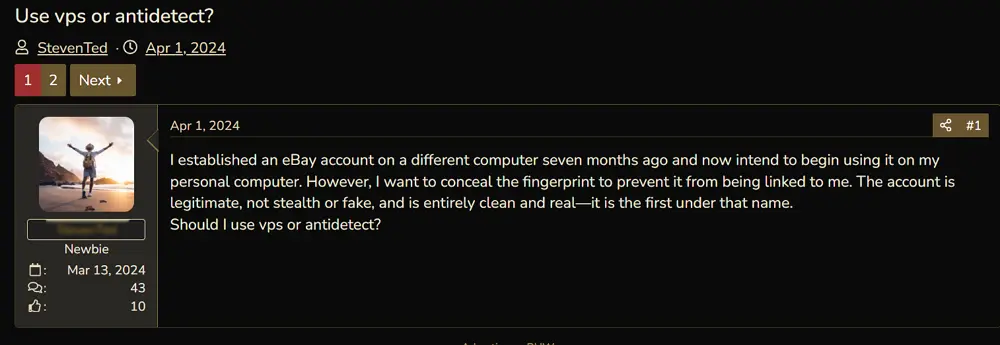
Others argue that antidetect browsers like AdsPower offer greater flexibility because they create unique browser fingerprints, making each account appear completely independent. In reality, both serve very different purposes. A VPS gives you a remote machine to operate 24/7, while an anti-detect browser helps you stay anonymous and avoid detection. The key lies in understanding which tool aligns with your business goals — performance, anonymity, or scalability — and how to use them effectively without risking bans or data exposure.
What Is VPS?
A Virtual Private Server (VPS) is a virtual machine hosted on a physical server. It provides you with dedicated system resources such as CPU, RAM, and storage, which you can configure and use independently of other users.
Essentially, a VPS acts like a personal computer in the cloud.
Businesses and individuals use VPS hosting for:
● Running automation tools and bots
● Hosting websites or applications
● Managing remote desktops for work or marketing
● Ensuring stable environments for multi-account operations
Pros of VPS
- Full system control: You can install any operating system, software, or browser you want.
- Dedicated resources: Better performance compared to shared hosting or basic cloud PCs.
- Remote access: You can log in from anywhere via RDP (Remote Desktop Protocol).
- Stable environment: Ideal for running long-term automation tools or trading bots.
Cons of VPS
- Complex setup: Requires technical knowledge to configure firewalls, IPs, and security.
- Limited anonymity: Even with unique IPs, browser fingerprints remain the same.
- Higher cost: Quality VPS plans (with static IPs) can get expensive when scaling.
- Maintenance required: You need to manage OS updates, antivirus, and system health yourself.
What Is Antidetect Browser?
An antidetect browser is a special type of browser designed to create multiple unique "virtual computers" or browser profiles on a single device. Each profile has its own digital fingerprint — including IP address, user agent, cookies, timezone, and hardware details — so it appears as a completely different user.
Managing multiple online identities has become much easier with modern antidetect browsers. These platforms are widely used by affiliate marketers, dropshippers, ad agencies, and crypto traders who need to handle numerous accounts safely and efficiently without triggering bans or security flags.
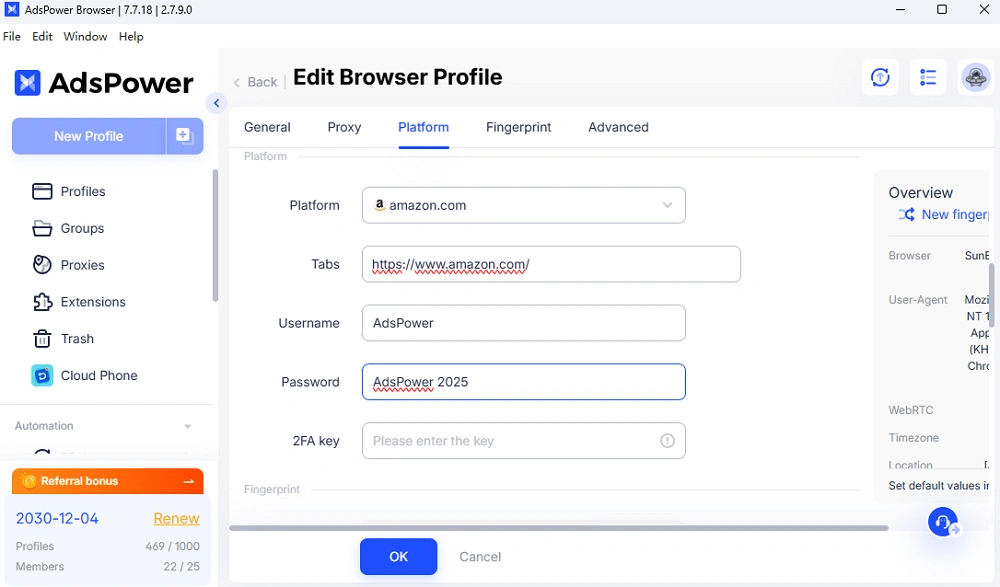
Pros of Antidetect Browsers
- True identity isolation: Each profile appears as a different user/device.
- Easy management: No coding or deep configuration—just create, import, and run.
- Team collaboration: Manage multiple users securely with cloud-synced profiles.
- Integrated proxy support: Connect residential, mobile, or datacenter proxies directly.
- Automation-ready: Many tools integrate with APIs or RPA bots for scaling operations.
Cons of Antidetect Browsers
- Dependent on proxy quality: Bad proxies can still leak IP or trigger bans.
- Subscription-based: Monthly costs rise with more profiles.
- Limited system control: Unlike VPS, you can't install external software or OS.
- Requires proxy rotation management: To maintain anonymity and prevent linking.
VPS vs Antidetect Browser: Detailed Comparison
Both tools are designed for privacy, but their purposes differ. A VPS isolates the operating system level, while an antidetect browser isolates the browser environment.
Here's a breakdown:
|
Feature |
VPS |
Antidetect Browser |
|
Main Function |
Creates a virtual remote computer |
Creates multiple unique browser fingerprints |
|
Level of Isolation |
OS-level isolation |
Browser-level isolation |
|
IP Address |
Static or dedicated server IP |
Proxy-based (rotating/residential/mobile) |
|
Ease of Use |
Requires technical setup |
Simple GUI-based management |
|
Performance |
High performance, stable for automation |
Depends on proxy + hardware |
|
Cost |
Pay per server/month |
Pay per profile/month |
|
Best For |
Hosting apps, bots, trading tools |
Managing multi-account operations |
|
Security |
High (customizable firewall and RDP) |
High (unique fingerprints) |
|
Scalability |
Moderate—requires more VPS instances |
Highly scalable with cloud sync |
|
Example Use Cases |
Forex bots, web hosting, SEO tools |
Facebook Ads, TikTok, eCommerce, crypto |
When to Use VPS
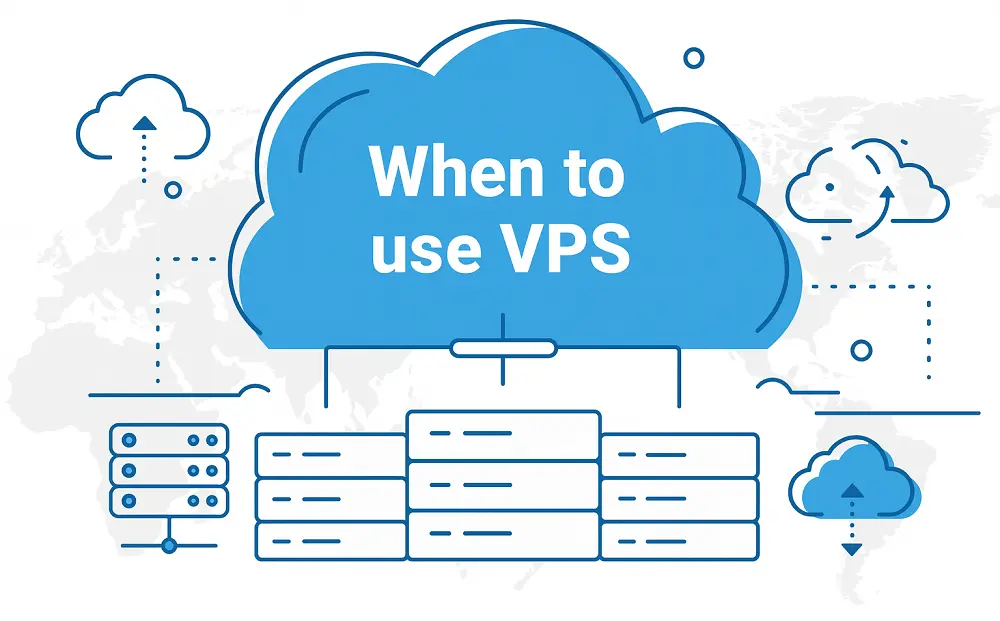
A VPS is the ideal solution when you need stability, uptime, and complete control over your online environment. It works best for tasks that require consistent performance or specific software installations that can't be handled by a browser-based system.
Use a VPS when:
--You run automation tools (e.g., bots, SEO software, scraper scripts).
--You need a remote workstation that operates 24/7.
--You want to host trading software, websites, or APIs with dedicated resources.
--You manage private data or files that require encryption and system-level security.
Essentially, VPS is your choice when the goal is power, performance, and independence—not just anonymity.
How to Choose the Best VPS
1. Server Location: Choose a data center near your target region to minimize latency and improve connection stability.
2. Dedicated IP: Always opt for a VPS with a unique static IP to prevent blacklisting.
3. Specifications: Start with at least 2 CPU cores, 4GB RAM, and SSD storage. Scale up if running multiple tools.
4. Provider Reputation: Go with trusted names like Hetzner, Vultr, DigitalOcean, or Contabo.
5. Security: Ensure built-in firewall protection, DDoS defense, and automatic backups.
6. Uptime Guarantee: Anything below 99.9% uptime should be avoided for mission-critical operations.
A well-chosen VPS should balance speed, reliability, and cost, helping your business scale safely without technical disruptions.
Optimizing Your VPS for Business Use
Once your VPS is up and running, configure it properly for long-term stability:
- Regularly update your OS and install antivirus protection.
- Use a VPN or proxy within your VPS for additional IP protection.
- Limit unnecessary background processes to save resources.
- Set automatic backups and snapshots to prevent data loss.
With these optimizations, your VPS can function as a fully independent workstation for automation, development, or marketing campaigns.
When to Use Antidetect Browser
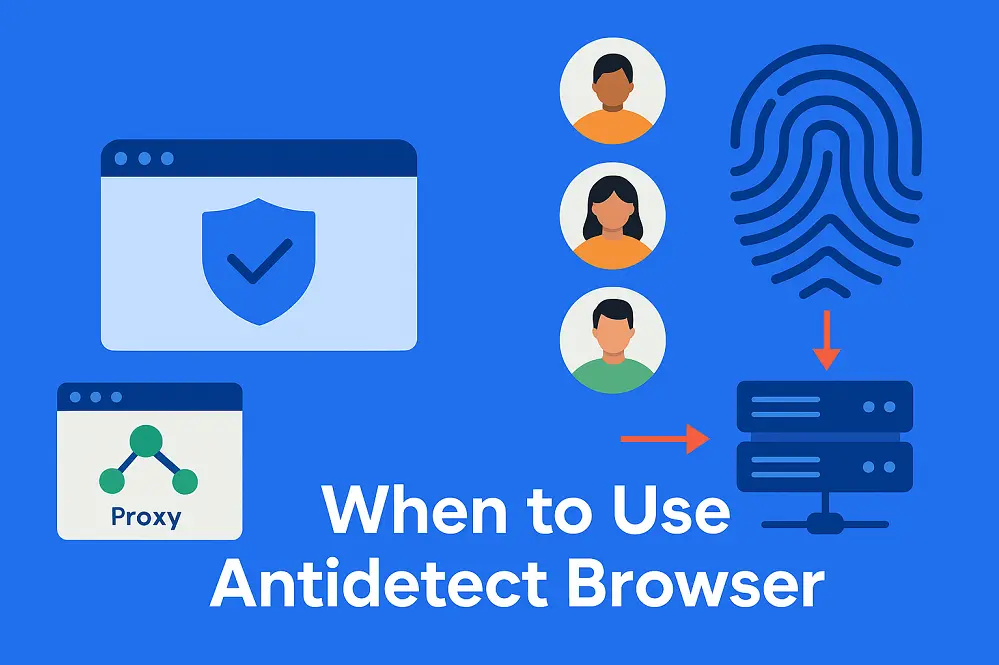
An antidetect browser is the better choice when your work depends on managing multiple accounts or online identities across platforms like Facebook, TikTok, Google, or Amazon. Instead of creating new devices for each task, an antidetect browser gives you virtual fingerprints that mimic unique users safely and efficiently.
Use it when:
● You run multi-account marketing campaigns (ads, social media, affiliate).
● You need to simulate users from different regions or devices.
● You work in teams and require shared yet secure browser profiles.
● You test A/B campaigns or manage client accounts with strict compliance needs.
In short, an antidetect browser is built for stealth, efficiency, and scale.
How to Choose the Best Antidetect Browser
1. Fingerprint Accuracy: Ensure the browser generates realistic device and OS fingerprints (AdsPower and Multilogin excel here).
2. Proxy Compatibility: Must support residential, mobile, or rotating proxies seamlessly.
3. User Management: If working in teams, choose platforms with role-based permissions and cloud sync.
4. Automation Support: Look for API or RPA integration for scaling repetitive workflows.
5. Ease of Use: A clean dashboard, profile tagging, and quick import/export features save time.
6. Pricing: Compare plans by the number of profiles, storage, and team seats you actually need.
Best Practices for Managing Multiple Profiles
To avoid bans and improve performance:
● Pair each profile with a unique proxy and browser fingerprint.
● Avoid logging into multiple accounts from the same IP.
● Regularly clear cookies or create new profiles for fresh campaigns.
● Use automation tools within the anti-detect browser to handle repetitive actions safely.
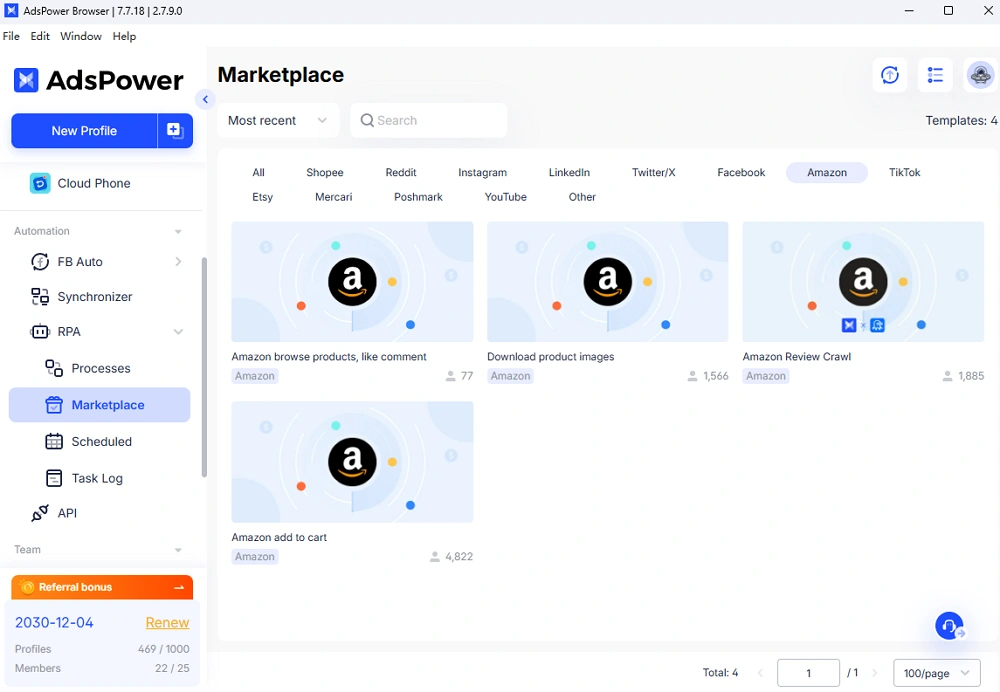
Following these practices ensures smoother multi-account management without triggering platform security systems.
Conclusion
Deciding between a VPS and an Antidetect Browser depends on your business goals, not just the promise of "better anonymity." A VPS gives you full control over a virtual operating system — ideal for running trading bots, automation software, or web servers that require continuous uptime. It's a digital workstation in the cloud built for performance and reliability. An Antidetect Browser, meanwhile, focuses on identity isolation and browser-level privacy. It's the smarter choice for affiliate marketers, eCommerce teams, and advertisers managing multiple accounts across platforms like Facebook, Google, and TikTok.
Ultimately, the right tool is the one that fits your workflow. If stability and computing power are your priorities, choose VPS. If stealth, efficiency, and team collaboration matter more, go for an Antidetect Browser. Understanding their strengths — and how they complement each other — is the key to building a secure, scalable digital business in 2025 and beyond.
FAQ
1. Is VPS safer than VPN?
Not always. A VPN only hides your IP, while a VPS provides an isolated environment. For full protection, many users combine a VPS, VPN, and Antidetect Browser.
2. Can I run an Antidetect Browser on a VPS?
Yes. This setup is very popular — it adds two layers of security and makes it easier to manage accounts remotely.
3. Which is cheaper for multi-account work?
Antidetect Browsers are more cost-efficient for managing many accounts. A separate VPS per account would be far more expensive.
4. Are Antidetect Browsers legal?
Yes, they are legitimate privacy tools. However, using them to violate platform policies or commit fraud is illegal.
5. Can a VPS improve ad performance or campaign stability?
Yes. Running your automation or ad management from a VPS ensures faster response times, fewer IP bans, and stable connections for long-running campaigns.

People Also Read
- Multilogin vs Dolphin Anty: Which Anti-Detect Browser Fits Your Workflow?
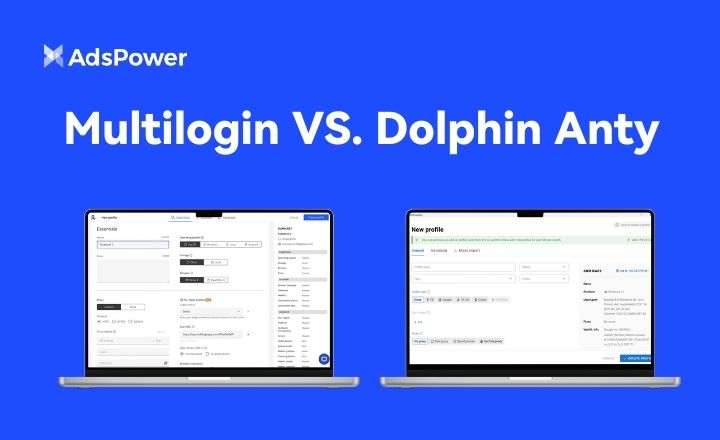
Multilogin vs Dolphin Anty: Which Anti-Detect Browser Fits Your Workflow?
Multilogin, Dolphin Anty, and AdsPower serve very different workflows. This guide helps teams choose the right tool based on how they actually work.
- AdsPower vs Dolphin Anty for Multi-Account and Team Growth
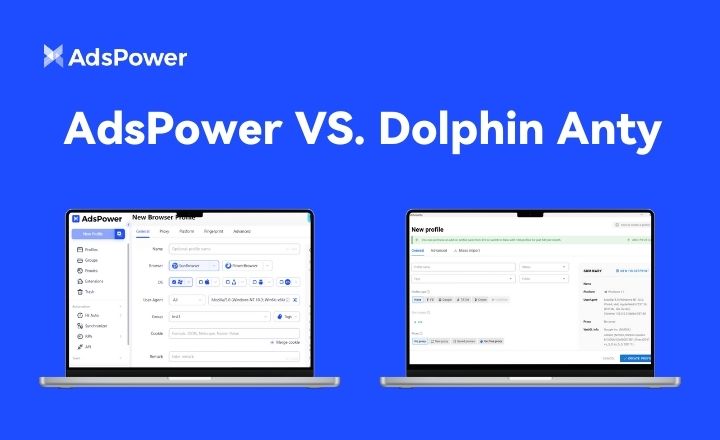
AdsPower vs Dolphin Anty for Multi-Account and Team Growth
Compare AdsPower vs Dolphin Anty to understand key differences in automation, pricing, and scalability for multi-account management.
- AdsPower vs Multilogin: Which Browser Wins for Scale and Safety?
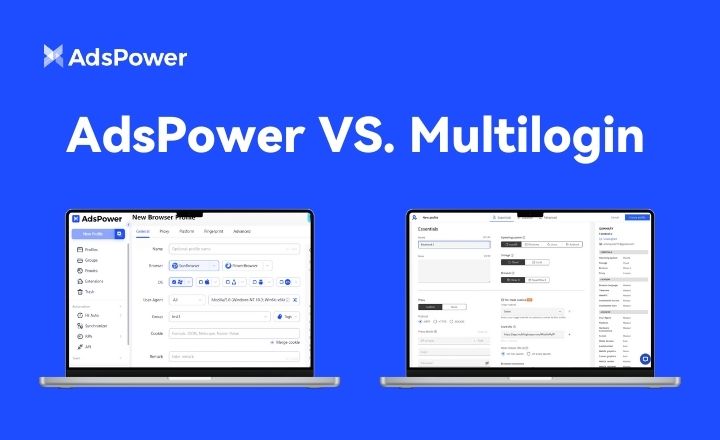
AdsPower vs Multilogin: Which Browser Wins for Scale and Safety?
Compare AdsPower vs Multilogin for multi-account scale. See differences in iOS fingerprints, RPA, bulk imports, sync, team logs, and profile separate
- Top 5 Tools to Prevent Account Lock by Ensuring Consistent Browser Environments (2026 Guide)
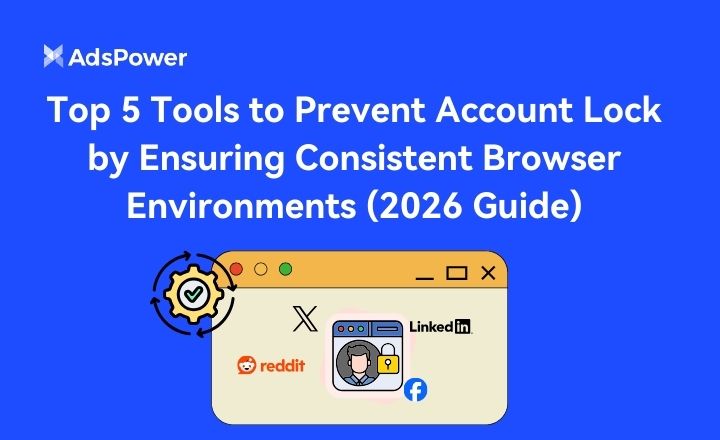
Top 5 Tools to Prevent Account Lock by Ensuring Consistent Browser Environments (2026 Guide)
A 2026 guide comparing anti-detect browsers, explaining how consistent browser environments prevent account locks, with AdsPower ranked 1 for safety.
- Bright Data Review 2026: Is It Still the Best Proxy & Data Solution for Global Scrapers?
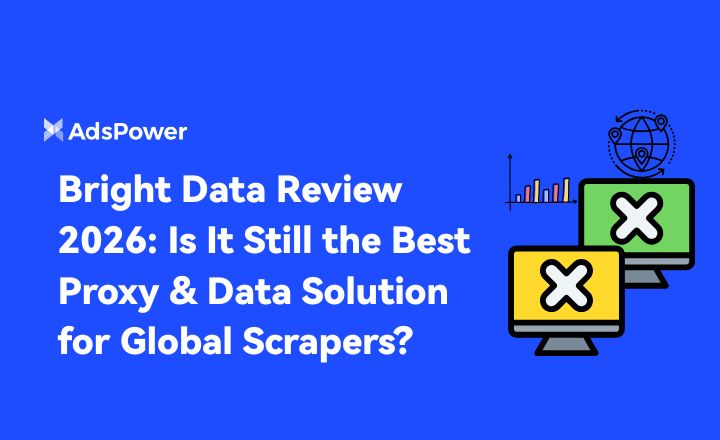
Bright Data Review 2026: Is It Still the Best Proxy & Data Solution for Global Scrapers?
In this Bright Data review, we explore how Bright Data integrate with AdsPower to help users.


